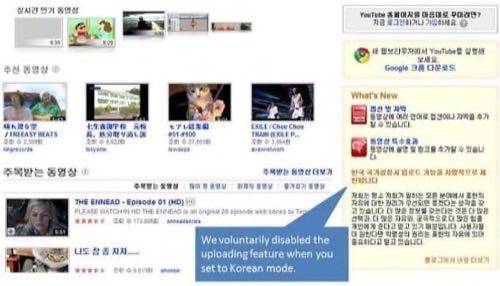Google has disabled both uploads of videos and comments on the Korean version of YouTube after the South Korean government tried to enforce a new law which requires web sites with at least 100,000 users to verify the person’s real name if they upload files or leave comments. The Cyber Defamation Law, as it’s called, went into effect on April 1st. According to officials at the Korea Communications Commission (KCC), the country’s broadcasting and telecommunications regulator, the law is an attempt to quell the cyber-bullying and spread of misinformation on the internet. However, critics say that it’s just another example of the Lee Myung-bak government’s overzealous efforts to monitor and control cyberspace.

The new requirements for web sites were rushed into legislation after the death of a popular Korean actress, Choi Jin Sil, who was driven to suicide after a series of online rumors and threats. Since people now have to submit their real name when uploading content, the government hopes this will cut down on the problem of cyber-bullying in the country.
Or perhaps that’s just what they want you to believe, say critics. The Korea Times, for example, notes that it’s more likely that the government is simply continuing its crackdown on free speech. Already they have been “repeatedly attacked by bloggers,” the paper reports, “first over the controversial decision to resume U.S. beef imports, and more recently for its ineptitude in economic policies. The watershed moment came in January when police arrested Park Dae-sung, a blogger known more widely as ‘Minerva’ and a frequent critic of the government’s economic polices, on charges of ‘deliberately’ undermining public interest by distributing fraudulent information.”
Google Provides an Alternative Method for Uploads
In response to the new legislation, Google has decided they would rather prevent uploads and comments instead of requiring YouTube users to submit their real names and national ID number – a number similar to the United State’s Social Security Number and yet another requirement of the new law.
“We have a bias in favor of freedom of expression and are committed to openness,” said Lucinda Barlow, a spokeswoman for YouTube in Asia. “It’s very important that if users want to be anonymous that they have that chance.”
Another Google spokesperson, Rachel Whetstone, vice president of Global Communications & Public Affairs at Google, was quoted in The Hankyoreh newspaper as saying “we concluded in the end that it is impossible to provide benefits to internet users while observing this country’s law because the law does not fall in line with Google’s principles.”

In addition to blocking uploads and comments, Google informed Korean YouTube users via their Korean Google blog that they can change their preference setting to a country other than Korea if they want to continue to upload and comment on videos.
An Easy Way for Google to Look Good?
If Google had complied with the law, it would have represented the first time that the company had ever collected the actual names of internet users.
Still, while many are congratulating Google on taking a stand and protecting freedom of expression on the internet, in this case the company wasn’t really risking that much. That’s because in Korea, Google has a much smaller presence than its domestic counterparts like www.naver.com and www.daum.net. Let’s see how the company behaves in countries where they have a much larger market share.
Image credit: Asiajin

















